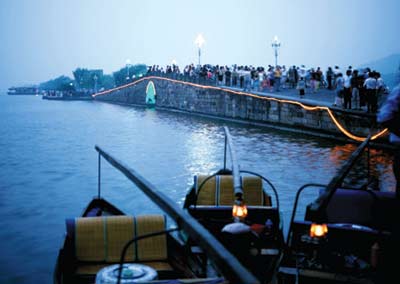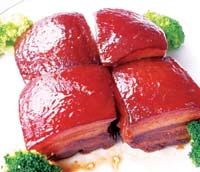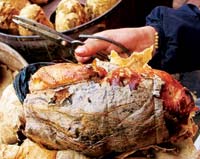| Hungry in Hangzhou |
| http://www.sina.com.cn 2004/12/10 18:38 thats China |
A culinary odyssey By Patrick Bai  Hangzhou In the minds of the Chinese, the city of Hangzhou in present-day Zhejiang Province has long held its status as a near paradise on earth. There is even an ancient expression still well-known today -"Shang you Tiantang, xia you Su Hang" - which literally translates as "Above there is heaven, on earth there are Suzhou and Hangzhou." Centuries ago, when that phrase was created, the city was the cultural star of China, the birthplace of innumerable scholars and artists, and even the bustling capital under the Southern Song dynasty (1127-1279).
While the West Lake, Solitary Hill, Protecting Chu Pagoda, and other natural and man-made features of Hangzhou are the main sources of the city's reputation, its celebrated food cannot be overlooked. Hangzhou cooking is the most famous school of Zhejiang cuisine, one of China's eight main culinary traditions. Hangzhou food has had a significant influence on the development of Shanghai cooking and is recognized as one of the healthiest and most sophisticated types of cuisine in this country. The city's gastronomic reputation goes back to when it was the cultural and culinary center of China. Marco Polo visited Hangzhou sometime between 1276 and 1292, a trip that inspired a gushing entry in his diary in which clearly describes an elegant restaurant open for public parties and other events. Polo's awe is easy to understand, for similar businesses would not open in Europe for hundreds of years.
Nowadays, restaurants in Hangzhou enjoy a nationwide reputation. Eateries serving Hangzhou-style food are fixtures in major Chinese cities, particularly Shanghai, as a new generation of diners are wooed by the cuisine's light, complex flavors, healthiness and emphasis on fresh ingredients. A real sense of history is another pleasure of a Hangzhou meal, as many of the classic dishes have changed little from their ancient origins. One such dish is dongpo rou, a type of stewed pork named after its creator, the 11th century master poet Su Dongpo (also known as Su Shi). Su referred to himself as "the old gourmand" and is still recognized nearly as much for his gastronomical gusto, love of wine, and influential and delicious culinary creations as for his poetry. |
|
|
|
|
|
| Annotation |
| 新闻查询帮助 | |
| 热 点 专 题 | ||||
| ||||
|
教育频道意见反馈留言板 电话:010-62630930-5178 欢迎批评指正
新浪简介 | About Sina | 广告服务 | 联系我们 | 招聘信息 | 网站律师 | SINA English | 会员注册 | 产品答疑
Copyright © 1996 - 2004 SINA Inc. All Rights Reserved
版权所有 新浪网![]() 北京市通信公司提供网络带宽
北京市通信公司提供网络带宽

